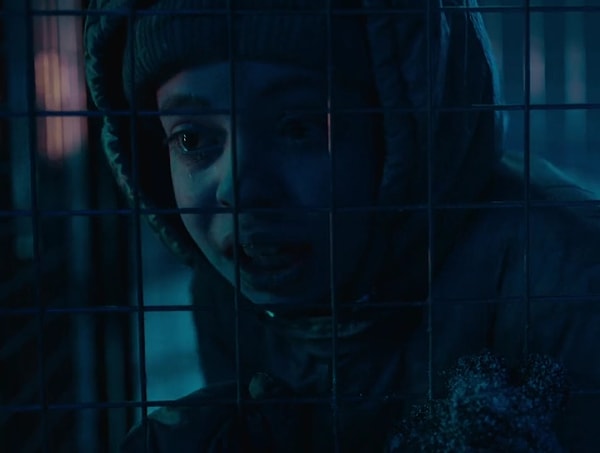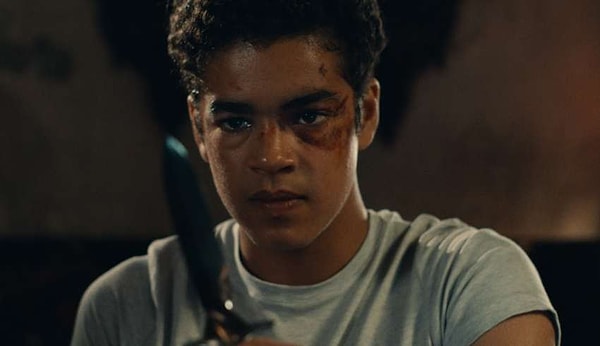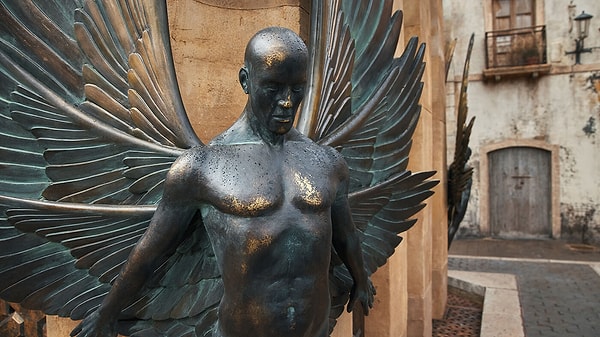Why You Should Be Watching 'His Dark Materials'
There's an air of reverence surrounding Philip Pullman and his bestselling trilogy 'His Dark Materials.' It's ambitious and beautifully crafted--a masterpiece, styled after Dante's Inferno and Paradise Lost. It's about young Lyra Belacqua who's accompanied by her daemon, a talking, shapeshifting animal named Pantalaimon.
Everyone in her world has one. It's a facet of their soul that follows them around. Children's daemons change shape until they take their final form during adolescence. They could have a dog trailing behind them, a monkey on their shoulder, or a toad resting on the arm of their chair. Whatever form their daemon took said something about their personality or who they were as a person. It could denote class, temperament, vocation, and of course, danger.
The story starts off cuddly. In the first book, The Golden Compass, Lyra lived in an alternate universe version of Oxford College. There she explores crypts, sneaks wine, and goes to war with the other children in the neighborhood. She starts to hear rumors about kids going missing--kidnapped by a group known as the Gobblers. Her friend Roger is taken and she goes off on a journey to the arctic to find him. Along the way, she meets a talking polar bear, pirates and witches. She flies above the snow in a hot air balloon, marveling over the Aurora Borealis. It sounds like the quintessential children's book, and it was. It spread throughout the UK and abroad rather quickly.

Courtesy of Hulu
Pullman knew how to shock the reader and intrigue them. He could be flowery and sometimes poetic, and he didn't seem to shy away from the darkness. We learn that Lyra's mother, Mrs. Coulter, was heading a government program that abducted children and severed them from their bonds with their daemons, turning them into mindless vegetables. It was considered a crime against humanity, like killing a piece of their soul.
Lyra rescues Roger from the arctic facility where the procedure is being performed, and takes him to her father, Lord Asriel, where she believes they'll be safe. Instead, Asriel severs Roger from his daemon, using the resulting energy burst to cut a doorway into another world.
It goes from zero to child sacrifice in a second, and looking back, it wasn't really that cuddly at all. It seemed cuddly, but the bears lived in a castle caked with walrus entrails. They kept Lyra prisoner, and the witches--rather than being benevolent wish granters, turned out to be a neutral and sometimes aggressive force. The facility where Roger stayed was disturbing. They'd pick children up off the streets, lure them in with candy and promises of an adventure, and then they'd ship them off to the north.

Courtesy of BBC via HBOMax
In the second book, The Subtle Knife, Lyra follows her father into another world and finds herself lost in a strange, empty city, resembling something you might find off of the coast of Italy or Spain. It was called Citagazze. There were wild packs of children, alone and abandoned by the adults, who were attacked by soul-devouring specters.
In our own world, we're introduced to a boy named Will Parry. Will's father, John, was an explorer who found a way into Lyra's universe. He disappeared when Will was young, forcing Will to take care of his mentally ill mother. Will finds his own door into Citagazze, where he meets Lyra and they become friends.
They find out that they are a part of a multiverse, an infinite series of universes connected to one another, like a fabric. Will obtains a knife that can cut through this fabric and create doors and windows, allowing them to travel from one world to the next.

Courtesy of BBC via HBOMax
When we're introduced to Will's world, we cross out of childish fantasy and into the more adult realm of science fiction, which helps to ground things and give the story a more realistic, somber tone. Will added to that effect with his serious, warrior-like attitude. Lyra, who carries a truth-tellng device called the alethiometer, ascertained that he was a murderer, who killed a man when leaving his world.
This is where things go from strange to psychedelic. We're introduced to even more religious concepts. In Lyra's alternative universe, the Reformation never happened. The Catholic Church evolved into a world super-power known as the Magisterium, which suppressed the spread of technology and ideas. They torture a witch into confessing that there's a prophecy about Lyra. They call her Eve, the original mother of sin. They say that she will be tempted and that when she falls she will conquer death.
There's no sudden onset of weirdness. The book eases you into things, seamlessly moving from a children's story to a religious epic, complete with inquisitions and pervy priests. It seems natural. You never stop to think about how outlandish things become. It's because Pullman uses the ground effect from the science fiction elements to suspend disbelief.

Courtesy of BBC via HBOMax
What comes next is a tapestry woven from myth so miraculously executed it's enough to give you chills. Pullman is an artful storyteller. He turns the ancient Legend of the Descent, a timeless story about a Goddess who descends into the underworld, into a scathing, modern commentary of the Christian religion. The fact that he managed to do so without alienating the reader or being laughed out of his profession is a testament to his mastery of the craft. it's powerful, disturbing, and impossible to put down.
The BBC adaptation is entering its third series. It follows the final book, The Amber Spyglass. In it, we learn that Lord Asriel has traveled across the multiverse, gathering an army to wage war against the Kingdom of Heaven. The plot is too shocking and too beautiful to fully divulge. It would be the ultimate spoiler in what has been called one of the greatest works of our generation.
If you aren't watching it, you should be.
His Dark Materials: Season 3 | Official Trailer | HBO
Keşfet ile ziyaret ettiğin tüm kategorileri tek akışta gör!

Send Comment